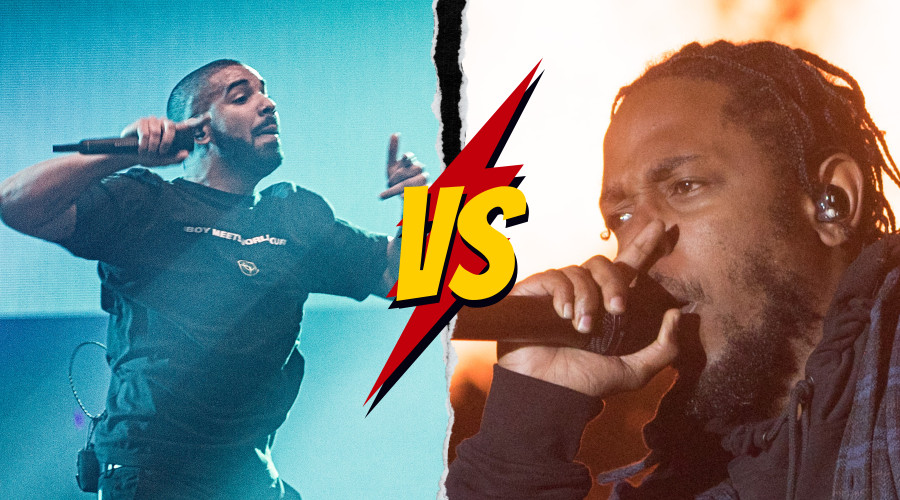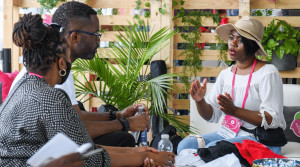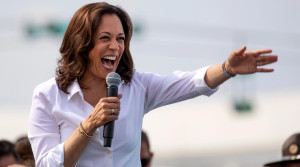The two heavyweights have gone after each other back and forth and it’s been a slugfest.
Kendrick took shots at Drake and J. Cole on Future and Metro Boomin’s song “Like That’, for declaring that Kendrick, Drake and Cole make up “the big three” in hip-hop on a Drake song J. Cole appeared on in October, ‘First Person Shooter.’ Kendrick’s verse was an aggressive, boastful, and pointed response but more of a flex than a declaration of war.
What’s followed has been a barrage of increasingly scathing diss tracks. Drake responded to Kendrick’s verse with an explicit diss track, ‘Push-ups’, then attempted to goad Kendrick with the AI-assisted ‘Taylor Made Freestyle.’
Kendrick finally addressed Drake with ‘Euphoria’ on April 30. Since then, we’ve got ‘Buried Alive Parody’, ‘Family Matters’ and ‘The Heart Pt. 6’ from Drake and Kendrick dropped ‘6:16 in LA’, ‘Meet the Grahams’ and ‘Not Like Us.’ And that was all in just one week.
“Beef and dissing one another is as old as hip-hop itself. It's been a part of the culture since its inception, literally,” explains Dalton Higgins.
Higgins is an award-winning journalist, and author of several books including Far From Over: The Music and Life of Drake. Higgins says rapping is rooted in an African-American tradition from the 1900s called “dozens.”
It’s a game, typically played by young men, where participants engage in verbal combat trying to one-up or upset each other, while displaying their creativity, and exchanging humorous, sometimes rhymed insults. People made fun of each other’s family, style, economic status, and physical characteristics; think Yo’ mama jokes.
In their attempts to best each other, both artists have displayed devilishly clever creativity.
On ‘Taylor Made Freestyle, ’ Drake uses AI to recreate 2Pac and Snoop Dogg’s likenesses, two hip-hop icons hailing from Kendrick’s home state, to taunt him. The song was eventually removed from streaming services after receiving a cease-and-desist order from 2Pac’s estate for using his likeness without consent. As controversial as it was for Drake to use AI this way, it was innovative and unprecedented and sparked a larger conversation.
{https://www.tiktok.com/@xeviuniverse/video/7365332691526569262?_r=1&_t=8mF3YxNZz0Q}
It’s all wildly entertaining for hip-hop fans, seeing two titans at the top of their game competing, and like any good rap beef, there’s been a bunch of funny, memorable and devastating bars. But it’s gotten ugly and at times very dark.
The song and the artwork for Kendrick’s ‘6:16 in LA’ apparently contain multiple meanings, alluding to everything from Drake’s dad to 2Pac, the OJ Simpson murder trial, HBO’s Euphoria which Drake is an executive producer of, the Bible, and more. This is after Drake dared Kendrick to include a quintuple entendre in his response. Kendrick also dedicated each verse from ‘Meet the Grahams’ to a different member of Drake’s family in a way that could be considered sincere and concerned if it wasn’t so scathing. It’s as brilliant as it is menacing and I’d never heard anything like that in a rap beef.
Both rappers have made some unsavoury, image-altering allegations about how the other treats women and girls. Drake accuses Kendrick of cheating and physically abusing his long-time partner, of colourism, as well as paying for sex. Kendrick accuses Drake of being a misogynist and says the members of his entourage are groomers and pedophiles. Neither provides any evidence for their vile claims, and they both deny all wrongdoing, but the damage is done.
There is something quite disturbing to consider from the accusations Drake and Kendrick have made against each other. Regardless of whether or not the allegations are true, and I hope for everyone involved, they aren’t…it’s disturbing that Kendrick and Drake have been sitting on this information about the other’s illegal and immoral actions. They’re apparently incensed and disgusted about it but they chose not to say or do anything about it until their beef ignited.
Regardless of who the better rapper is and who “wins” the beef, it’s an L for both of them that their righteous anger comes from a place of self-interest and not genuine concern for the well-being of women. Women are often collateral damage in hip-hop battles, and it’s been blatant and pretty gross. Given the nature of what each party has accused the other of, there’s little chance of the two reconciling a-la-Nas and Jay-Z. Especially not after Kendrick fans renamed Drake’s mansion 'Kendrick’s House' on Google Maps, and there was a shooting outside of his home days later where Drake's security guard suffered life-threatening injuries. Someone the police called “a person in crisis” also was arrested after trying to gain access to Drake’s home.
The tone/theme of the majority of the songs is not one of lyrical superiority but moral superiority like they’re scolding and trying to expose each other. This especially feels like the case from Kendrick’s perspective.
“It's the kind of lecture you give to your teenage kid hanging out with the wrong people,” Morgan Campbell said of Kendrick’s ‘6:16 in LA.’
Morgan Campbell is an award-winning journalist, and author of the memoir My Fighting Family: Borders, bloodlines and the Battles That Made Us. The book has been described as “a powerful reckoning with what it means to be Black in Canada—particularly when you have strong American roots.”
Campbell and other observers have noted that the beef between Kendrick and Drake feels deeply personal, aside from all the mud they’re slinging. Campbell (and I) compared Kendrick’s approach to this war of wars like an essay with arguments, “and each song addresses a different aspect of his hatred.”
The main points Kendrick hits are: Drake is a bad judge of character who’s unaware of the people close to him wishing for his downfall, his parents let down Drake, and now he’s failing his kid(s), Drake’s superficial, and he associates with young girls and sexual predators. Essentially, he’s not a good dude.
“Here's my section on you being a deadbeat dad. Here’s a section on you having really poor judgment about making friends. Your friends are just praying for your downfall and you don’t even know it. Here's my essay on ‘meet the grahams’ on how your parents failed you, now you're failing your kids. And here's another essay on how you like young girls and hang around sexual predators.”
“But when a parent gives that lecture to a kid, that comes from a place of love, that's not what you do to someone you hate. You don't warn them that their friends are rancid, you let them run into a brick wall.”
Some people have accused Kendrick, and to a more serious degree Rick Ross, of xenophobia and racism in their disses towards Drake because they’ve mentioned his biracial and Canadian identities. Campbell says people who critique that point are likely projecting and they don’t understand the reason for that argument, since Kendrick never actually attacked Drake because he’s biracial.
“The line from ‘Euphoria’ that stands out, ‘How many more Black features ‘til you feel like you’re Black enough?’ So Kendrick’s not even saying ‘Here's the bar you’ve got to clear in terms of Blackness’ he's identified some insecurity within Drake and he's just poking at it and poking at it,” Campbell explains.
Even before this beef, Drake was accused of “aping” and being a culture vulture for performing Blackness—American, Caribbean, and UK flavours—without properly engaging with and respecting the history and culture of the artists he’s associating with. The last verse in 'Not Like Us' and the punchline "No, you not a colleague, you a fuckin' colonizer" is damning. Campbell says, “They’re not wrong.”
Campbell points out Drake’s blaccent, which he says is meant to imitate the speech patterns of someone from the American Southeast, like Georgia or Florida. He points out that someone who hears African-American Vernacular English in their lives daily and acquires the accent naturally, as opposed to from the media, wouldn’t sound the way Drake does.
“He doesn’t come across as someone who grew up with a man in a house like my dad and my uncle,” Campbell said.
Campbell credits his parents for ensuring he was connected to Black America and his family’s history even though he was raised in Canada. He says he didn’t have questions “about who we were, where we were coming from.”
“Drake does not appear to have absorbed a lot of these lessons growing up. He engages with Black American culture as he grows up and gets more famous. But with this fundamental lesson that you didn’t pick up on earlier, that's why you're insecure and that's why [they] just keep going at you,” Campbell argues.
“Kendrick lays out that Drake’s out of touch with what it really means to be Black and American despite this strong Southeastern blaccent. He has to superficially perform it for the public and a lot of the non-Black public eats it up,” Campbell continued.
Drake hit back at Kendrick for attacking his Blackness and launched a critique of his own. Kendrick is widely viewed as a conscious and deliberately pro-Black rapper, on ‘Family Matters’ Drake pokes holes in that image.
He raps “Always rappin' like you 'bout to get the slaves freed / You just actin' like an activist, it's make-believe / Don't even go back to your hood and plant no money trees / Say you hate the girls I fuck, but what you really mean? / I been with Black and white and everything that's in between
You the Black messiah wifin' up a mixed queen / And hit vanilla cream to help out with your self-esteem.”
Campbell says Drake’s counter to the criticism, falls flat and “winds up bolstering them.”
“How does Drake respond to being told that he's out of touch with Black American culture, when he tries to shame Kendrick for being pro-Black. You say he’s rapping like he’s trying to get the slaves free…that’s an insult? If you think that line lands, you're part of the problem and it’s not the win you think it is.”
Kendrick’s strategy in this beef is clearly to “lay bare” what he sees as Drake’s character flaws and insecurities, and expose how he tries to compensate for them. The king of hip-hop is an emperor with no clothes.
Campbell says Kendrick is challenging Drake to “Take the mask off. I want to see who you are beneath the achievements,” he said.
Drake has often compared himself to Michael Jackson, in terms of his success. Kendrick takes advantage of this comparison and implores Drake to take MJ’s advice, and look at the man in the mirror and make changes.
“[Kendrick] suspects very strongly that Drake doesn't really like the man in the mirror which is why he's needling and poking. Ingenious and it's cruel," he says.
Drake has become the butt of a lot of jokes throughout this feud but there's a part of it where it's just really sad.
Whether or not something crosses a line is subjective, but Higgins calls some personal attacks levelled during beef “unnecessary”, “corny and cringe-worthy.”
For example, when people wish death, violence or illness on others. On ‘meet the grahams’, Kendrick raps to Drake’s mother, Sandra, “your son's a sick man with sick thoughts, I think niggas like him should die / Him and Weinstein should get fucked up in a cell for the rest their life.”
The line is so angry and aggressive, even in his cartoon-sh voice, it’s jarring.
In other feuds, on Chris Brown’s song, ‘Weakest Link’, he says that fans wish Quavo died, instead of his nephew and fellow Migos member, Takeoff. Nicki Minaj and Drake have made jokes about Megan Thee Stallion being shot in the foot by fellow rapper and former boyfriend, Tory Lanez. During the 2018 beef between Drake and Pusha T, Push mocked Drake’s producer, Noah “40” Shebib, for having multiple sclerosis.
“It's not cute, it's not fun. People that celebrate that, they themselves need to go get checked out as far as their own mental health and maturity,” Higgins argues.
Higgins says there’s an art to crafting skillful rhymes, but resorting to the lowest common denominators, like death, is “artless” and “stupid.”
The word fan comes from fanatic, and there’s the worry that a combination of social media and poor mental health could lead people to take extreme actions in defence of their idols.
“We have to be very careful with this stuff,” Higgins warns.

 By
By 


